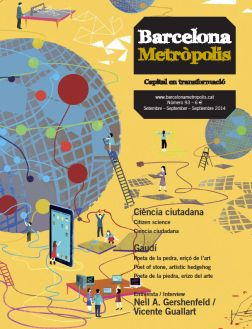Under the leadership of the city of Barcelona, the project iCity is becoming the European laboratory for the creation of services making use of public information systems.
“An advanced city is not one where the poor can get about by car, but rather one where even the rich use public transport.” Enrique Peñalosa, former mayor of Bogota.1
We are currently in the throes of a far-reaching economic and social crisis that has led us to rethink many of the foundations of what we used to know as the “welfare state”. Citizens are calling for a much more important role in the decision-making of their governments, which are now more accessible, and are demanding greater openness and transparency in the agreements made by their political representatives. This movement is known as open government.
According to the Xarxa d’Innovació Pública (Public Innovation Network),2 open government is “a new social paradigm in which citizens, organisations, political parties, public employees and elected officials can participate and interact directly in the discussion, definition, creation and assessment of government policies”.
But public administrations should not only open up more from the political standpoint, i.e. in matters related essentially to public participation, accountability and transparency. Public administrations can also unlock other assets that are very important in order to improve the public (and private) services offered to citizens. A good example of this is the creation of open data.
As Ortiz de Zárate3 noted, there are two types of open data promoted by governments: data for democratic purposes (related to accountability) and data for economic purposes (related to innovation and the promotion of the economy). Therefore, opening up public data is not just a political question. The measure also has a by no means negligible economic impact. According to the Spanish Ministries of Industry, Energy and Tourism and Finance and the Public Administrations, in 2012 the economic value of the reuse of open data by the Spanish brokerage sector was between 330 and 550 million euros.4
But is the opening up of public data for the joint creation of services between government and other social stakeholders sufficient? The answer is a blunt “No, it is not”. This is supported by the fact that there are currently almost thirty open data portals in Spain,5 but the jointly created (profit or non-profit) services that use the seven thousand-plus datasets already open6 are practically non-existent.
The under-utilisation of this important asset is due to several factors. Firstly, the amount of data actually open is still insufficient; secondly, the offer does not match existing demand; and finally, the fragmentation of the offer across different portals means that data are located in separate, unrelated silos. However, the quid of the matter is that the “promise” of open data is not being fulfilled. The opening of public data does not really facilitate the joint creation of services, public or private, by other stakeholders in society (essentially citizens and businesses).
We need to go one step further. Not only do data need to be open, but so too do the information systems that house them. The difference is a crucial one. We are talking about permitting the interaction between non-government actors with public information systems; an interaction based on reading and writing, or simply reading in the case of open data.
Creating platforms that permit a controlled opening up of public information systems would facilitate the joint creation of public and private services, profit-making or otherwise, thus multiplying the usefulness of these systems. In addition, access to information systems would be standardised with no need to modify them, by virtue of the development of a single-access language.
One good example of platforms that make it possible to open up public information systems is the European iCity Project7. Thanks to iCity, the managers of information systems, belonging mostly to public administrations, can open up certain functions in these systems, designing and controlling how they are accessed at all times, so that stakeholders from outside the public sector (citizens, companies, etc.) can develop services that use them.
Under the leadership of Barcelona, the iCity project has already secured the participation of cities such as Cornellà, Zaragoza, London, Bologna, Genoa and Lamia (Greece), and a further fifteen European cities have expressed an interest. It is thus becoming a European laboratory for the creation of services based on the use of public information systems, particularly in urban settings.
At this moment in time, iCity is the main tool permitting interaction between the inside and the outside of public organisations. In fact, thanks to this dialogue, companies are given a way of complementing their products and making them more appealing through the use of information systems of several cities, thus facilitating the internationalisation of their services. In a nutshell, the iCity Platform is called upon to promote innovation and creativity in the definition, creation and evaluation of public information system-based services.
References
1 – MSN News, 13/01/2011. “Enrique Peñalosa: ‘América Latina debe mirar más a Ámsterdam que a Miami’”.
2 – XIP (Xarxa d’Innovació Pública) [Public Innovation Network]. Govern Obert XIP Cat. Video on YouTube.
3 – Alberto Ortiz de Zárate. “Social data: el papel de la Administración en la sociedad del dato”. Blog Administraciones en red.
4 – Ministry of Industry, Energy and Tourism. Estudio de caracterización del sector infomediario en España (2012 edition).
5 – CTIC Foundation. “Public Dataset Catalogs Faceted Browser”.
6 – Marc Garriga Portolà. “Volumen actual de datasets abiertos en España”. Blog Caldo casero.
7 – iCity initiative website: http://icityproject.eu/.




